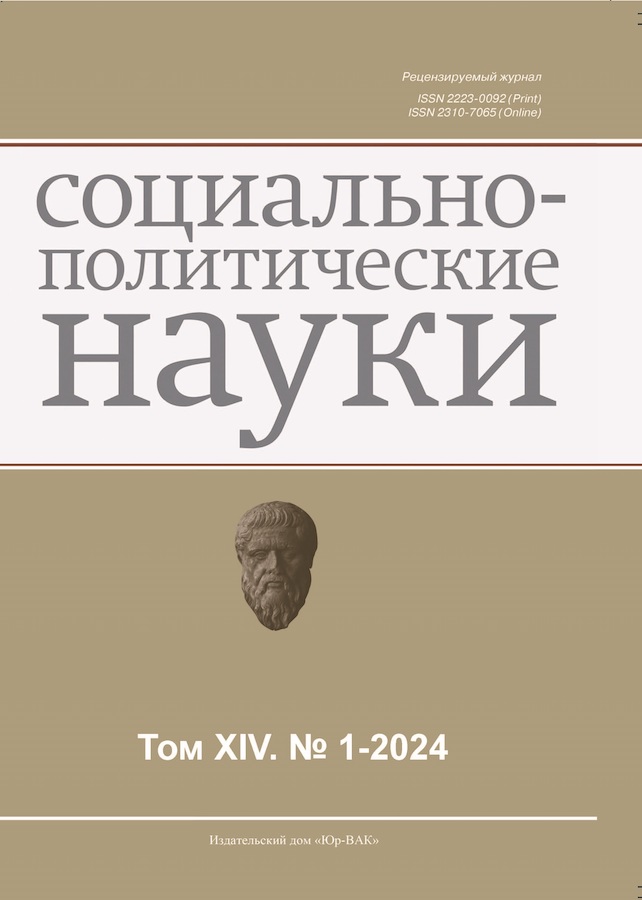Russia in the 2020s: Industry 4.0 and socio-political aspects of its integration in mass estimates of the population (based on sociological research)
- Authors: Kuriukin A.N.1
-
Affiliations:
- Institute of Sociology – Branch of the Federal Center of Theoretical and Applied Sociology of the Russian Academy of Sciences
- Issue: Vol 14, No 1 (2024)
- Pages: 41-52
- Section: Social Structure Social Institutions and Processes
- URL: https://journals.eco-vector.com/2223-0092/article/view/630533
- DOI: https://doi.org/10.33693/2223-0092-2024-14-1-41-52
- EDN: https://elibrary.ru/CIXIIF
- ID: 630533
Cite item
Abstract
Purpose of the study: to form an objective understanding of the socio-political issues of integrating Industry 4.0 technologies into modern society in general and Russian society in particular. Methodology. The author, using a wide range of the latest domestic and foreign sources, conducts a consistent analysis of the most general issues related to the topic of the work, gives a general description of the theoretical discourse on the integration of Industry 4.0 technologies into society, and considers the interpretation of socio-political aspects in a (joint) “smart” production of Industry 4.0, explores pressing problems with compliance with established socio-economic practices in joint intelligent production, explores the presence of “fear of the future” in society, attitude towards breakthrough innovations of Industry 4.0, using the example of a survey of European society, the attitude of Russian society to the perception of Innovation 4.0 is outlined. Conclusions. Based on the results of the analysis, the author comes to the logical conclusion that the traditional system of established socio-economic practices will undoubtedly face a whole range of new challenges that may lead to a change in views on its form and content, both theoretical and theoretical. and applied it. in terms of compliance and execution of the plan. Especially, according to the author, this can be clearly manifested in the corporate sphere, which in the foreseeable future will become increasingly complex, and in the judicial sphere, where it will be unclear who to file claims against as a result of a trial for restoration or compensation for harm based on the results of an established violation of civil law.
Keywords
Full Text
About the authors
Andrey N. Kuriukin
Institute of Sociology – Branch of the Federal Center of Theoretical and Applied Sociology of the Russian Academy of Sciences
Author for correspondence.
Email: kuriukin@inbox.ru
ORCID iD: 0000-0002-9572-3070
ResearcherId: I-4461-2018
Cand. Sci. (Polit.); senior researcher
Russian Federation, MoscowReferences
- Bachilo I.L., Shmakov M.A. On the transformation of the institution’s “state” and “law” in the information society. State and Law. 2017. No. 11. Pp. 82–83. (In Rus.)
- Guznov A., Mikheeva L., Novoselova L., Avakyan E. et al. Digital assets in the system of objects of civil rights. Law. 2018. No. 5. P. 42. (In Rus.)
- Lopatin V.N. Risks of information security during the transition to a digital economy. State and Law. 2018. No. 3. Pp. 77–88. (In Rus.)
- Popova O.A. New subjects of the information society and knowledge society: On the issue of normative legal regulation. Journal of Russian Law. 2018. No. 11. Pp. 14–24. (In Rus.)
- Rodimtseva M.Yu. Regulation cannot be manipulated (about the risks of the information society). State and Law. 2016. No. 7. Pp. 67–72. (In Rus.)
- Sannikova L.V., Kharitonova Yu.S. Transformation of law in the digital era: A look into the future. State and Law. 2019. No. 9. Pp. 87–96. (In Rus.)
- Strukov N.K. Control function of the state in the sphere of virtual space (using the example of the Russian Federation): Abstract of dis. ... Cand. Sci. (Law). Moscow, 2019.
- Transformation of law in the digital era: monograph. Ministry of Science and Higher Education of the Russian Federation, Altai State University. A.A. Vasilyeva (ed.). Barnaul: Publishing House of the Altay University, 2020. 432 p.
- Khabrieva T.Ya. The right to choose digital reality. Journal of Russian Law. 2018. No. 9. Pp. 5–16. (In Rus.)
- Cabrelli D., Graveling R. Health and safety in the workplace of the future. Briefing PE 638. 2019. Pp. 434–439.
- Kott A. Intelligent autonomous agents are key to cyber defense of the future aero networks. The Cyber Defense Review. 2019. Pp. 57–65.
- Kriebitz A., Lütge Ch. Artificial intelligence and human rights: A business ethical assessment. Business and Human Rights Journal. 2020. Vol. 1. Рр. 3–12.
- McCorquodale R. et al. Human rights due diligence in law and practice: Good practices and challenges for business enterprises. Business and Human Rights Journal. 2017. Vol. 2. Рр. 195–210.
- Moore P.V. Study on data subjects, digital surveillance, AI and the future of work. Brussels: European Parliament Research Service, 2020. P. 53.
- Ruggie G. Power, authority and relative autonomy: Multinationals as Global Institution. Regulation & Governance. 2018. Vol. 12. Рр. 311–317.
- The digital decade. Summary. Special Eurobarometer 532. Brussel, 2023. 44 p.
- Thompson D.F. Responsibility for failures of government: The problem of many hands. The American Review of Public Administration. 2014. Vol. 44. Рр. 259–280.
- Zerk J.A. Extraterritorial jurisdiction: Lessons for the business and human rights sphere from six regulatory areas. Corporate Social Responsibility Initiative Working Paper No. 59. Cambridge, MA: John F. Kennedy School of Government, Harvard University, 2010. 222 р.
Supplementary files













